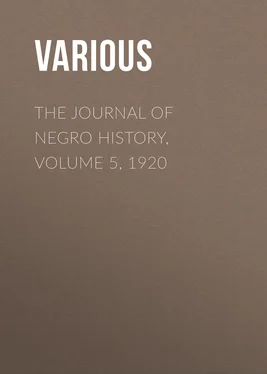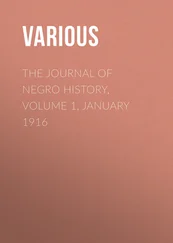Various - The Journal of Negro History, Volume 5, 1920
Здесь есть возможность читать онлайн «Various - The Journal of Negro History, Volume 5, 1920» — ознакомительный отрывок электронной книги совершенно бесплатно, а после прочтения отрывка купить полную версию. В некоторых случаях можно слушать аудио, скачать через торрент в формате fb2 и присутствует краткое содержание. Жанр: foreign_antique, periodic, История, foreign_edu, на английском языке. Описание произведения, (предисловие) а так же отзывы посетителей доступны на портале библиотеки ЛибКат.
- Название:The Journal of Negro History, Volume 5, 1920
- Автор:
- Жанр:
- Год:неизвестен
- ISBN:нет данных
- Рейтинг книги:4 / 5. Голосов: 1
-
Избранное:Добавить в избранное
- Отзывы:
-
Ваша оценка:
- 80
- 1
- 2
- 3
- 4
- 5
The Journal of Negro History, Volume 5, 1920: краткое содержание, описание и аннотация
Предлагаем к чтению аннотацию, описание, краткое содержание или предисловие (зависит от того, что написал сам автор книги «The Journal of Negro History, Volume 5, 1920»). Если вы не нашли необходимую информацию о книге — напишите в комментариях, мы постараемся отыскать её.
The Journal of Negro History, Volume 5, 1920 — читать онлайн ознакомительный отрывок
Ниже представлен текст книги, разбитый по страницам. Система сохранения места последней прочитанной страницы, позволяет с удобством читать онлайн бесплатно книгу «The Journal of Negro History, Volume 5, 1920», без необходимости каждый раз заново искать на чём Вы остановились. Поставьте закладку, и сможете в любой момент перейти на страницу, на которой закончили чтение.
Интервал:
Закладка:
Canadians took a measure of pride in the sense of security with which their Negro immigrants could look back at their pursuers. That the slavery issue in the United States was rapidly coming to a head was also recognized in Canada during the fifties and this, too, may have been an influence with the Canadians in doing what they could to assist the great number of more or less helpless people who came among them. Viewed in the light of more than half a century it can be seen that the influence of Canada in determining the course of the slavery issue was by no means slight.
Fred LandonRICHARD HILL 127
Richard Hill, one of Jamaica's most famous sons, was born at Montego Bay on the first of May, 1795. In 1779 his father, also named Richard, came to Jamaica from Lincolnshire, where the family had lived for several centuries, and along with a brother settled at Montego Bay. There he became a substantial merchant, and on his death in 1818 left his property in Jamaica to his son and two daughters, Ann and Jane. Hill's mother, who had East Indian as well as Negro blood in her veins, survived her husband many years, her son being constant in his attention to her up to the last.
At the early age of five Hill was sent to England to reside with his father's relations then living at Cheshunt, there to remain till his fourteenth year when he was sent to the Elizabethan Grammar School at Horncastle to finish his education. Upon the death of his father in 1818 Hill returned to Jamaica. Although his property came into the possession of his son and two daughters the father's death in some way involved Richard Hill in irksome money obligations which harassed him for many years, and even after he had discharged them left a gloom over his life.
His father was a man in advance of his times, hating and deploring the intolerance and the tyranny that grew out of slavery as it then existed in Jamaica. On his death-bed he made his son solemnly pledge himself to devote his energies to the cause of freedom, and never to rest until those civil disabilities, under which the Negroes were laboring, had been entirely removed; and, further, until slavery itself had received its death-blow.
The time and opportunity for fulfilling this pledge soon came, for in the year 1823 the Negroes in Jamaica commenced their agitation for obtaining equal privileges with their white brethren. It does not appear that Hill attached himself openly to any of the societies that were formed for the purpose of carrying on this agitation. But he freely gave them the benefit of his abilities, helping the whole movement with his advice and with his pen. 128
In the year 1826 Hill visited Cuba, the United States and Canada, and then went on to England, landing there in September. In 1827 he was deputed by the organization in Jamaica to use his efforts in England to secure the assistance of the leading members of the Anti-Slavery party. During his stay there he was on terms of close intimacy with Wilberforce, Buxton, Clarkson, Babington, Lushington and Zachary Macaulay, 129all members of the Anti-Slavery Society, as well as Pringle and other men eminent for their philanthropy and talents and noted for the deep interest they took in all that related to the elevation and welfare of the Negroes of the British West Indian colonies. The petition from the people of color of this island to the House of Commons for the removal of their civil disabilities, was entrusted to Hill, who upon the occasion of presenting it was permitted "within the bar" of the House. On that occasion Canning delivered his last speech a splendid effort in favor of the petitioners. Hill remained several years in England and contributed largely by his pen and his speeches to enlighten the public mind of England as to the real character of West Indian slavery. But the remittances from the "people of color" in Jamaica, never very large, soon became few and far between. So Hill, always independent in every way, even in his friendships and political alliances, maintained himself and his sister, Jane, almost entirely by his contributions, literary and scientific, to several popular newspapers and periodicals. 130
After a residence of several years in England, Hill was sent by the Anti-Slavery Society on a visit to San Domingo, chiefly for the purpose of ascertaining by personal observation and inquiry what was the actual social and political condition of the people of that island. 131But his commission had a more extensive object than that attached to it, which, however, directed him to obtain besides all the information he possibly could concerning the natural resources of every part of the country through which he was to travel. San Domingo was then under the wise and able rule of President Boyer, the whole island forming one undivided republic, enjoying internal tranquillity, and being in a comparatively flourishing condition. On his way from England to Port-au-Prince, where he arrived on the sixteenth of June, 1830, Hill visited France staying there a few months. He spent nearly two years in San Domingo travelling incessantly and making notes about everything. He has left more than one sketch-book full of sketches showing a knowledge of perspective, a keen eye for the picturesque and a true artist's feeling. He sailed from San Domingo for England on the third of May, 1832, and then for Jamaica a few months after, never again to quit his native country. In that year he was made justice of the peace for Trelawny.
He was never greedy for money and seems to have been ill-paid for his labors in San Domingo. Upon his return to Jamaica either on that account or from motives of policy he ceased all communication with the Anti-Slavery Society, and only now and then did he write to one or two of its members, and even then more as personal friends than as old political allies.
On the third of February, 1834, Hill was appointed one of a number of forty stipendiary magistrates whose duty it was to adjudicate between the former slaveholders and their "apprentices." 132This appointment he held until the first of January, 1872. In this connection it may be interesting to quote the opinion of Hill expressed by the Rev. James Thome and J. H. Kimball, who in 1838 published for the American Anti-Slavery Society an account of Emancipation in the West Indies: a six months' tour in Antigua, Barbadoes and Jamaica in the year 1837 . They say: "We spent nearly a day with Richard Hill, Esq., the secretary of the special magistrates' departments, of whom we have already spoken. He is a colored gentleman, and in every respect the noblest man, white or black, whom we met in the West Indies. He is highly intelligent and of fine moral feelings. His manners are free and unassuming, and his language in conversation fluent and well chosen.... He is at the head of the special magistrates (of whom there are sixty ( sic ) in this island) and all the correspondence between them and the governor is carried on through him. The station he holds is a very important one, and the business connected with it is of a character and extent that, were he not a man of superior abilities, he could not sustain. He is highly respected by the government in the island and at home, and possesses the esteem of his fellow citizens of all colors. He associates with persons of the highest rank, dining and attending parties at the government house with all the aristocracy of Jamaica. We had the pleasure of spending an evening with him at the solicitor general's. Though an African sun has burnt a deep tinge on him he is truly one of nature's nobleman. His demeanor is such, so dignified, yet so bland and amiable, that no one can help respecting him." 133
Hill represented St. James and afterwards Trelawny in the House of Assembly which sat from October 24, 1837, to November 3, 1838, and during that time he served on several important committees, notably one appointed to inquire into the state of the several courts of justice in the island. But the fact that he unsuccessfully contested the representation of Port Royal in November, 1838, may have had something to do with his withdrawal from political strife. About 1840 he was offered the governorship of St. Lucia, but his love for his native island caused him to decline the offer. He was in 1855 nominated a member of the Privy Council which post he held only about ten years.
Читать дальшеИнтервал:
Закладка:
Похожие книги на «The Journal of Negro History, Volume 5, 1920»
Представляем Вашему вниманию похожие книги на «The Journal of Negro History, Volume 5, 1920» списком для выбора. Мы отобрали схожую по названию и смыслу литературу в надежде предоставить читателям больше вариантов отыскать новые, интересные, ещё непрочитанные произведения.
Обсуждение, отзывы о книге «The Journal of Negro History, Volume 5, 1920» и просто собственные мнения читателей. Оставьте ваши комментарии, напишите, что Вы думаете о произведении, его смысле или главных героях. Укажите что конкретно понравилось, а что нет, и почему Вы так считаете.












